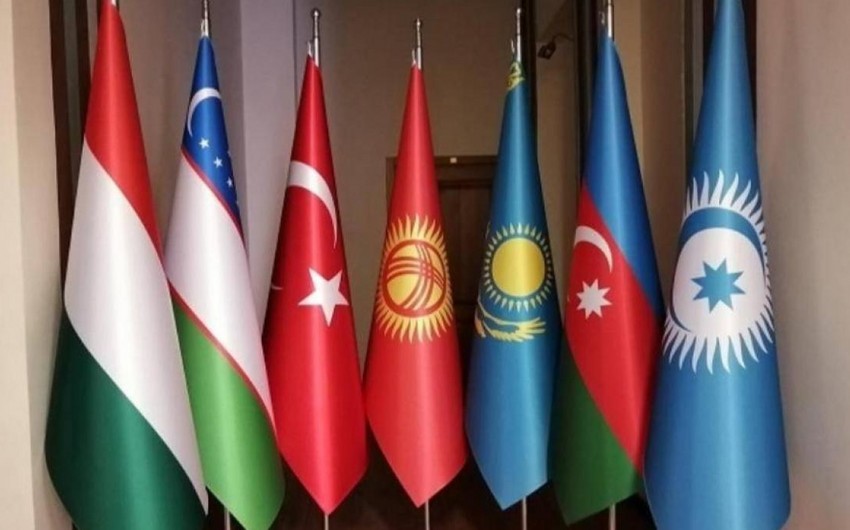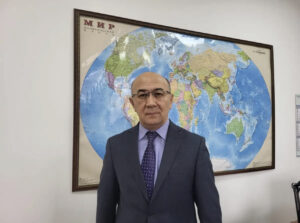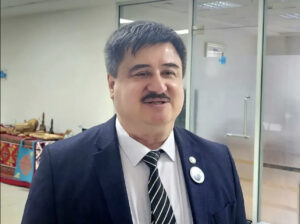ASTANA – Astana is set to host the tenth Organization of Turkic States (OTS) Summit on Nov. 3, where member countries will discuss pressing geopolitical and integration issues.

Photo credit: report.az.
Just last month, the organization celebrated the 14th anniversary of its establishment. The Nakhchivan Agreement, signed in 2009, established the Turkic Council, which aims to provide a collaborative platform for all Turkic-speaking states.
The primary goal behind the formation of the Turkic Council was to deepen cooperation among Turkic-speaking countries and contribute to regional peace and stability. This cooperation is founded on a shared historical and cultural heritage and linguistic ties.
In 2021, the Turkic Council was officially renamed the Organization of Turkic States during the eighth summit of Turkic Council leaders in Istanbul.
Amir Bashbayev, the head of the analysis and forecasting group at the Institute of Foreign Policy Studies under the Kazakh Ministry of Foreign Affairs, and Uzbek political expert Ravshan Nazarov, a senior researcher at the Institute of State and Law of the Academy of Sciences, discussed the role of the organization and the upcoming summit’s agenda in separate interviews with the Kazinform news agency.
Significant steps of the organization
According to Bashbayev, the organization has made substantial progress over the past 14 years in promoting cooperation among Turkic-speaking countries and strengthening the OTS. Notably, the adoption in 2021 of the “Vision of the Turkic World – 2040” and the subsequent development of roadmaps for its implementation have provided a considerable impetus to diversify the OTS’s activities.

Amir Bashbayev, Head of the analysis and forecasting group of the Institute of Foreign Policy Studies under the Ministry of Foreign Affairs. Photo credit: inform.kz.
“The organization previously functioned primarily as a platform for dialogue. The accumulated synergy over the past years has propelled it forward. The OTS is now evolving into a union of states highly interested in advancing trade and economic cooperation, as reflected in its robust growth,” he said.
The intra-trade turnover among the OTS member countries has increased to $27 billion, compared to $21 billion in 2021.
Nazarov echoed the focus on economic cooperation and highlighted the dynamic development in bilateral multi-dimensional cooperation among the OTS countries.
“Kazakhstan is one of Uzbekistan’s top three foreign trade partners, after China and Russia. The trade turnover between Kazakhstan and Uzbekistan exceeded $3 billion in the first nine months of this year. Uzbekistan and Türkiye have also seen their mutual turnover grow annually, with 370 new joint ventures established in 2022,” he added.

Ravshan Nazarov, Uzbek political expert and senior researcher at the Institute of State and Law of the Academy of Sciences. Photo credit: inform.kz.
Additionally, Nazarov mentioned ongoing collaborative projects. Plans are underway between Uzbekistan and Hungary to establish a poultry farming cluster, introduce an airline, and commence the production of medicines, components, and chemical products. Meanwhile, Azerbaijan and Uzbekistan are exploring partnerships in sectors like energy, chemistry, transportation, machinery, and construction.
Bashbayev pointed out the significance of the Trans-Caspian International Transport Route (TITR) in the current cooperation, with plans for a new alternative route through the Kyrgyz Republic, Uzbekistan, and Turkmenistan being considered by China.
“The potential opening of the Zangezur Corridor in the South Caucasus (a 40-kilometer-long transport corridor project proposed by Azerbaijan) could create a unified transportation corridor, offering direct access to Türkiye through Nakhchivan and significantly increasing the trade turnover among the OTS member countries,” he said.
Summit agenda
The forthcoming summit, according to Bashbayev, is likely to center around reviewing accomplishments and discussing future strategies for the organization’s development.
“For example, the issue of unimpeded freight transport within the Vision of the Turkic World – 2040 is currently under consideration,” he said.
Among the documents scheduled for discussion at the upcoming summit, Bashbayev underscored the proposal to establish a civil protection mechanism within the OTS, including the adoption of a legal framework for joint responses to emergencies.
Nazarov anticipates a summit agenda centered on the imperative to strengthen unity within the Turkic world in response to complex geopolitical and geo-economic challenges. Discussions will also encompass enhancing political, socio-economic, and cultural-humanitarian cooperation.
“Issues related to formulating a consolidated position on the current Middle East conflict may be raised,” he added.
Another topic on the agenda will be harmonizing the organization’s activities with other forms of cooperation. As an illustration of this positive approach, Nazarov pointed out the participation of the President of Azerbaijan, Ilham Aliyev, in the fifth Consultative Meeting of the Heads of Central Asian States.
Kazakhstan’s role in the OTS
“Kazakhstan traditionally plays an active role in all areas of cooperation within the OTS, including cultural, humanitarian, and educational aspects. In the educational sphere, our country is significantly involved in developing a unified alphabet for Turkic-speaking countries through the Turkic Academy,” said Bashbayev.
He also noted that the preparation of common textbooks on history, geography, and literature is underway. According to him, this will lead to the next generation speaking a common language, which will be an essential factor in bringing Turkic peoples closer together.
“In the current turbulent conditions, states and peoples with common roots and history should find it easier to unite and cooperate, which will benefit each of them,” he added.
The tragic earthquake in Türkiye this year served as a test of solidarity among Turkic states. During this challenging time, all countries demonstrated solidarity and unity, while Kazakhstan was among the first to provide humanitarian aid to the Turkish people.
The OTS prospects
“Based on the adopted documents, the organization aims to become economically robust by 2040. By that time, all the legal frameworks will be in place to put the four main principles of the OTS into action: the free movement of goods, services, capital, and labor,” said Bashbayev. This will enable member countries to stimulate their economies and reduce their reliance on resource-based technology.
In his view, it is a positive factor that Hungary, a European Union member, serves as an observer in the OTS. Together, all members have the potential to establish a solid foundation for transforming the OTS into a regional powerhouse that unites the economic, financial, transportation, investment, and legal potential of member countries.
Ultimately, Nazarov considers the OTS to be a promising project of international integration.
“It is possible that soon, the organization will also attract the interest of other states, such as those in the Balkans,” he concluded.

